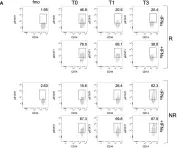Studying how single nucleotide polymorphisms (SNPs) crosstalk with non-autologous factors to cause complex autoimmune diseases is challenging. An amino acid replacement in the neutrophil cytosolic factor 1 (NCF1-339/NCF1R90H) leading to lower reactive oxygen species induction has been reported as the major SNP for systemic lupus erythematosus (SLE). Here we show that infection with the murine norovirus (MNV) contributes to the induction of lupus in Ncf190H mice. Mutant NCF190H upregulates the IFN-α/JAK1/STAT1 pathway in macrophages and anti-MNV-antibody production. In parallel, the MNV infection of NCF190H mice upregulates Toll-like receptor 7 in macrophages, plasmacytoid dendritic cells and B220+ splenocytes, thereby promoting germinal center formation and lupus-associated autoantibodies production. These compounded effects lead to protection against MNV infection but also glomeruloneph ritis with proteinuria and lupus arthritis in the absence of chemical inducers such as pristane. Our data thus suggest that this SLE-associated SNP, NCF190H, synergizes with MNV infection to induce the development of mouse lupus.
© 2025. The Author(s).
Product Citations: 3
In Nature Communications on 13 February 2025 by Li, Y., Oliveira-Coelho, A., et al.
-
Immunology and Microbiology
In Viruses on 19 October 2022 by Alomari, N. & Totonchy, J. E.
Kaposi's sarcoma-associated herpesvirus (KSHV) is associated with vascular endothelial cell tumor, Kaposi's sarcoma (KS) and lymphoproliferative disorder, multicentric Castleman's disease (MCD), primary effusion lymphoma (PEL) and KSHV inflammatory cytokine syndrome (KICS). Dysregulation of proinflammatory cytokines is found in most KSHV associated diseases. However, little is known about the role of host microenvironment in the regulation of KSHV establishment in B cells. In the present study, we demonstrated that IFN-γ has a strong inhibitory effect on KSHV infection but only in a subset of tonsil-derived lymphocyte samples that are intrinsically more susceptible to infection, contain higher proportions of naïve B cells, and display increased levels of IRF1 and STAT1-pY701. The effect of IFN-γ in responsive samples was associated with increased frequencies of germinal center B cells (GCB) and decreased infection of plasma cells, suggesting that IFN-γ-mediated modulation of viral dynamics in GC can inhibit the establishment of KSHV infection.
-
FC/FACS
-
Homo sapiens (Human)
-
Immunology and Microbiology
In Frontiers in Immunology on 13 August 2022 by Tucci, G., Garufi, C., et al.
Baricitinib is a Janus kinase (JAK) 1 and 2 inhibitor approved for treating rheumatoid arthritis (RA). The JAK/STAT system is essential in the intracellular signaling of different cytokines and in the activation process of the monocyte lineage. This study verifies the effects of baricitinib on STAT phosphorylation in monocytes of RA patients and evaluates the correlation between STAT phosphorylation and response to therapy. We evaluated the disease activity of patients (DAS28CRP) at baseline (T0) and after 4 and 12 weeks (T1-T3) of treatment with baricitinib, dividing them into responders (n = 7) and non-responders (n = 7) based on the reduction of DAS28CRP between T0 and T1 of at least 1.2 points. Through flow cytometry, STAT1 phosphorylation was analyzed at T0/T1/T3 in monocytes, at basal conditions and after IL2, IFNα, and IL6 stimulation. We showed that monocyte frequency decreased from T0 to T1 only in responders. Regarding the phosphorylation of STAT1, we observed a tendency for higher basal pSTAT1 in monocytes of non-responder patients and, after 4 weeks, a significant reduction of cytokine-induced pSTAT1 in monocytes of responders compared with non-responders. The single IFNα stimulation only partially recapitulated the differences in STAT1 phosphorylation between the two patient subgroups. Finally, responders showed an increased IFN signature at baseline compared with non-responders. These results may suggest that monocyte frequency and STAT1 phosphorylation in circulating monocytes could represent early markers of response to baricitinib therapy.
Copyright © 2022 Tucci, Garufi, Pacella, Zagaglioni, Pinzon Grimaldos, Ceccarelli, Conti, Spinelli and Piconese.
-
FC/FACS
-
Homo sapiens (Human)
-
Immunology and Microbiology
In Front Immunol on 13 August 2022 by Tucci, G., Garufi, C., et al.
Fig.3.A

-
FC/FACS
-
Homo sapiens (Human)
Collected and cropped from Front Immunol by CiteAb, provided under a CC-BY license
Image 1 of 1
